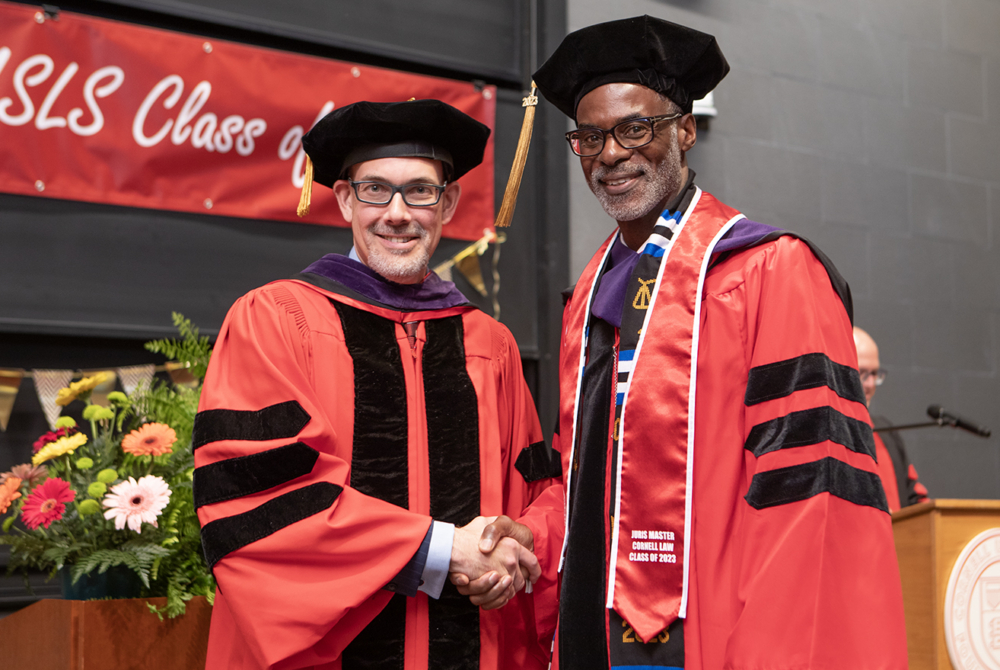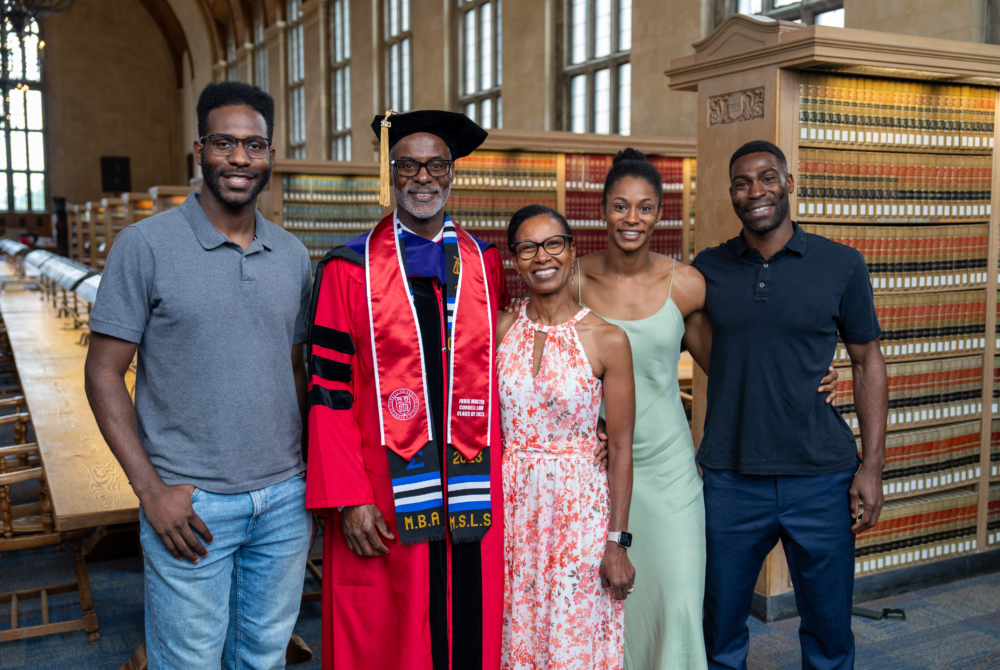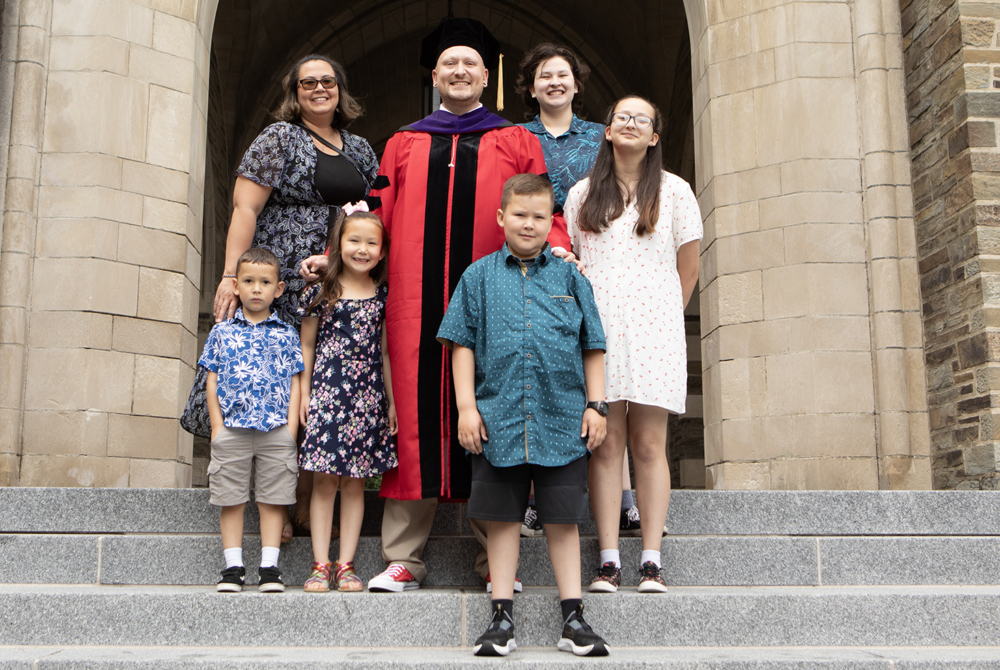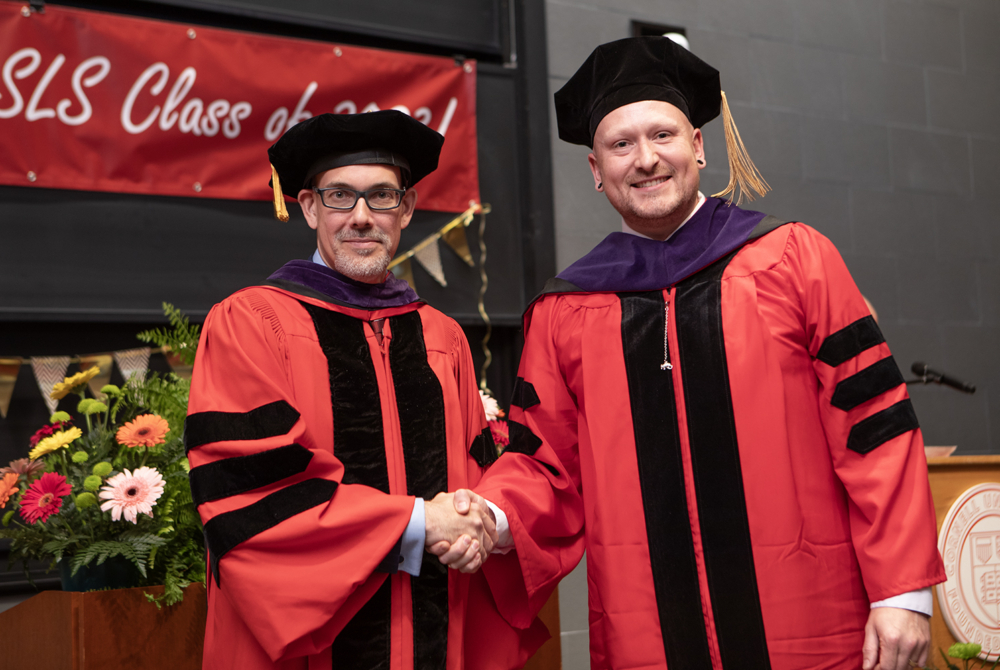This website uses cookies
We use cookies to ensure that we give you the best experience on our website. If you continue to use this site we will assume that you are happy with it.
Uriah Nalikak, MSLS ’23, was raised in Alaska and dedicated his career to economic development and promoting equity to improve the well-being of the Alaska Native people. Eufard Cooper, MSLS ’23, built a career in finance, ultimately focusing on the utility industry. They were attracted to Cornell Law School’s Master of Science in Legal Studies (MSLS) program for different reasons, but shared a common goal as articulated by Diogo Magalhaes, academic director of the MSLS program, at their graduation on August 12.
Magalhaes told the graduates they were fulfilling “the premise of our law school, which is to inform and nurture a group of astute, broad-minded, and ethically grounded business leaders in the finest sense . . . Your capstone projects clearly demonstrate that you have both mastered the skills we taught you and that you have used them to address systemic inequities, corporate sustainability challenges, and other important societal problems we face today.”
Both Nalikak and Cooper were aware of the systemic inequities in their fields and have developed new ways to address them, thanks to the legal knowledge acquired in their studies. “Everybody should get a master’s in law,” says Nalikak. “From patents to contracts and negotiations, all the things we covered in the courses and the deep understanding from the professors, reinforces how law impacts every facet of your life. It’s valuable information.”
“I have a much broader understanding of the plethora of issues and feel much more equipped to see around the corners,” says Cooper. “Not knowing what you don’t know can be dangerous.”
For Nalikak, the knowledge acquired will advance his efforts to set up a system of food banks to ensure Native communities have access to necessary resources while tapping into the legal and policy frameworks and initiatives that exist to support these efforts. Nalikak notes that food insecurity can reach 60% in some rural areas of Alaska and any approach to enhancing wellbeing must consider traditional practices. He relays the story of one well-intentioned effort that failed and lessons learned: “One village was running out of food because the caribou herd had not migrated near the village as expected that year. Food distributors sent tons of food in the form of salmon filets and Costco chickens, but these people didn’t have a taste for any of it and they didn’t know how to prepare it.”
The key to a successful food distribution system is to continuously engage the Native communities, understand their tastes and traditions, provide options for diverse and healthy foods, ensure safe practices in food handling, storage and distribution, and raise awareness and education for all those impacted. Though Nalikak focused on the needs of the Utqiaqvik community on the northernmost coast of Alaska, the lessons learned are universal: “There are food deserts throughout the lower 48 where people don’t have access to the right foods,” says Nalikak. “Just telling them what they need is not the right approach. Asking them and respecting their values while setting up a distribution system responsive to their needs and supported by the regulations and policies in place can both nourish and empower people.”
Similarly, providing access to affordable energy in outlying communities requires systems and programs “to meet people where they are,” says Cooper, who did his capstone project on “The Road to Energy Equity.” Together with his wife, Cooper runs CES Utility Solutions which advises utilities and green energy developers. While their company advises and supports clients on critical energy infrastructure, “The idea of the capstone is to identify opportunities in green energy to allow underserved communities access to equitable solutions. Much of today’s push for green energy is policy-based. Political layers get in the way. Any equitable system also needs to engage the community, not talk down to them or simply offer discounts. The community should have an ownership stake of some kind in a truly equitable system.”
Now, with degree in hand, and inspired by Magalhaes’ words at graduation, both Cooper and Nalikak are prepared to “fulfill the promise and the expectation of this program and apply what you have learned to make positive changes in society.”

Jens Ohlin (left), the Allan R. Tesller Dean of Cornell Law School, congratulates Eufard Cooper, MSLS ’23

Eufard Cooper, MSLS ’23, with his family following graduation

Uriah Nalikak, MSLS ’23, with his family following graduation

Jens Ohlin (left), the Allan R. Tesller Dean of Cornell Law School, congratulates Uriah Nalikak, MSLS ’23